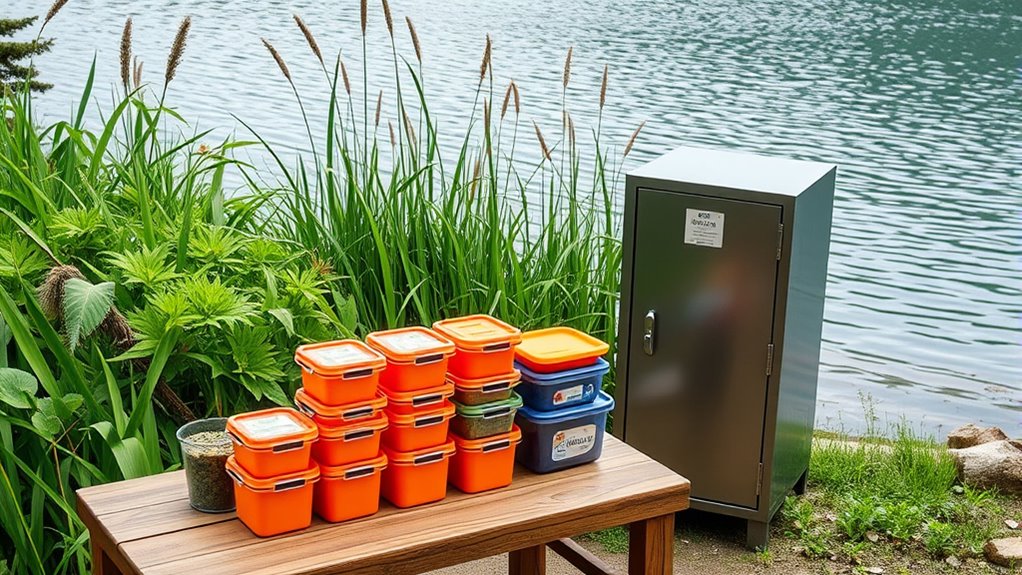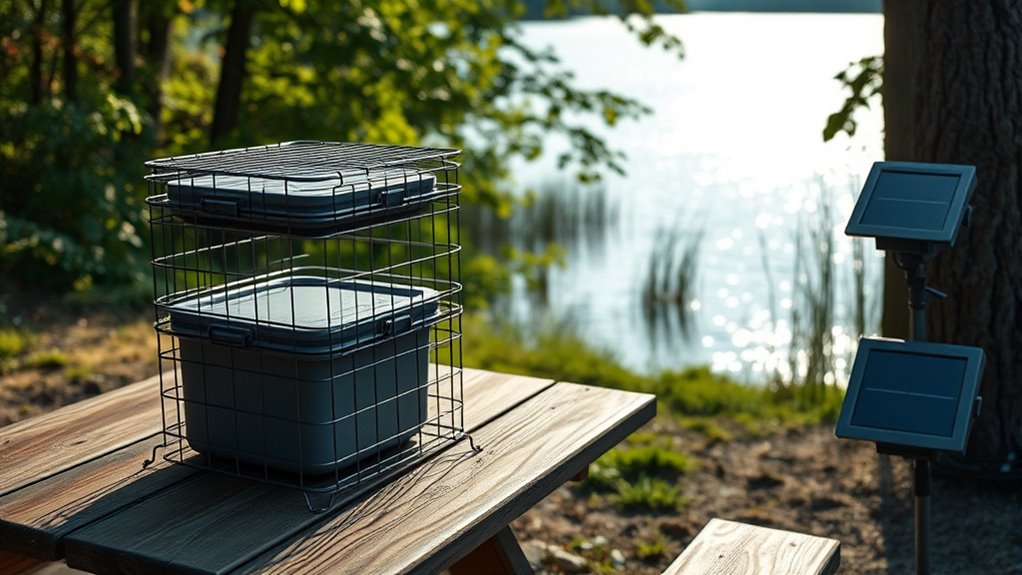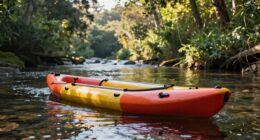To store food near water without attracting wildlife, keep containers in high, natural barriers like rocks or dense vegetation, and out of animal sight. Use airtight, bear-proof containers to control odors and prevent pests. Regularly clean and wipe containers to eliminate smells, and camouflage your storage with tarps or netting. Minimize noise and disturbance around the area, and stay vigilant for signs of animal activity. Learning more tools helps reinforce your food safety efforts effectively.
Key Takeaways
- Store food in airtight, scent-proof, bear-proof containers and keep them elevated away from water and wildlife pathways.
- Choose storage sites on higher ground behind natural barriers like rocks or dense vegetation to reduce visibility.
- Regularly clean containers and storage areas to eliminate odors and prevent attracting animals.
- Cover storage with camouflage netting or tarps to hide scents and deter wildlife curiosity.
- Minimize noise and movement around storage to avoid drawing attention from water-dependent animals.

Storing foods near water can be risky if you don’t take proper precautions. Wildlife behavior around water sources is often unpredictable, and animals are naturally attracted to the scent of food, which can lead to frequent visits and potential conflicts. To protect your supplies and guarantee effective food preservation, you need to understand how animals are likely to behave and how to minimize their interest in your stored items. The key is to make your food storage less appealing and more secure, reducing the chances of attracting wildlife in the first place.
Waterfront food storage risks attracting wildlife; secure supplies and minimize odors to prevent visits and conflicts.
Start by choosing your storage location carefully. Keep your food containers well away from the water’s edge, preferably on higher ground or behind natural barriers like rocks or dense vegetation. This setup makes it less visible and accessible to animals that are accustomed to foraging near water. Use airtight, bear-proof containers whenever possible, as these not only prevent animals from smelling the food but also help in food preservation by keeping moisture and pests out. Remember, many animals have an acute sense of smell, and even small food odors can draw them in from a distance.
When it comes to food preservation, avoid leaving any crumbs, wrappers, or residual smells behind. Clean your storage area regularly and wipe down containers to eliminate lingering odors. If you’re storing perishables, consider using refrigeration or coolers with tight seals, but only if you have a power source nearby. Otherwise, your best bet is to pack foods into scent-proof containers designed for outdoor use. This helps maintain the quality of your food and discourages animals from investigating further.
Additionally, try to reduce movement and noise around your storage area. Wildlife behavior is often triggered by sudden sounds or vibrations that indicate human activity, so minimizing disturbances can prevent animals from becoming curious or bold enough to approach. Cover your storage with a tarp or camouflage netting, but ensure there’s no direct scent leakage. Keeping a clean, odor-free environment is your best defense against attracting unwelcome visitors.
Finally, stay vigilant. Regularly check your storage setup for signs of animal activity or damage. If you notice tracks, chewed containers, or disturbed vegetation, it’s a sign to relocate your storage or reinforce your barriers. By understanding wildlife behavior and taking proactive steps, you’ll considerably improve your chances of maintaining food preservation while keeping animals at bay. Glycolic acid is an example of a substance that can improve skin texture, but in outdoor food storage, the focus should remain on minimizing attractants and using secure containers. With patience and careful planning, you can enjoy the water’s proximity without risking your supplies or attracting unwanted wildlife to your campsite or waterfront area.
Frequently Asked Questions
Can Electric Fencing Prevent Wildlife From Accessing Stored Food?
Yes, electric fences can effectively prevent wildlife from accessing stored food. By acting as a wildlife barrier, they deter animals from crossing into restricted areas. You should install the electric fencing around your storage space, ensuring it’s well-maintained and energized. This approach creates a safe, humane way to keep wildlife out while protecting your food. Remember, proper installation and regular checks are key to maintaining its effectiveness.
What Smell-Proof Containers Work Best Near Water Sources?
Imagine your food as a whispered secret, safe from prying wildlife. Scent proof technology in odor resistant containers works best near water sources, locking in smells like a vault. Look for containers with airtight seals and durable materials that block odors completely. These containers prevent scents from escaping into the air, keeping your food discreet, fresh, and wildlife-free. Choose wisely, and your stash stays hidden and secure.
Are There Specific Foods That Wildlife Is More Attracted To?
Wildlife tends to be more attracted to foods with strong scents like sweet fruits, bread, or processed snacks, as these match their natural food preferences and produce attractant scents. Avoid leaving such foods exposed or in open containers near water, since their aroma can draw animals from a distance. To prevent attracting wildlife, store all food in scent-proof containers and keep them sealed tightly, especially when camping or near water sources.
How Often Should Stored Food Be Checked for Wildlife Intrusion?
Like a vigilant guardian, you should check your stored food at least once a week. Regular inspection frequency guarantees you catch any signs of wildlife intrusion early. Incorporate pest monitoring during these inspections to detect small issues before they escalate. This consistent vigilance helps protect your food, preserves your peace of mind, and keeps unwanted visitors at bay, especially when storing near water, where wildlife is naturally drawn.
Do Natural Repellents Effectively Deter Animals From Food Storage?
Natural repellent effectiveness varies depending on the animal and repellent used, so they might not fully deter wildlife. Wildlife deterrent methods like securing food in airtight containers and using physical barriers are often more reliable. While natural repellents can help, you shouldn’t rely solely on them. Combining multiple wildlife deterrent methods, including natural repellents, gives you the best chance of keeping animals away from your stored food near water.
Conclusion
Storing food near water might feel like walking a tightrope, but with these tips, you can keep wildlife at bay and enjoy your outdoor adventures. Always use airtight containers, keep food elevated, and dispose of waste promptly. Remember, a well-sealed bag is more powerful than a fortress, protecting your food from curious critters. When you take these precautions, you’ll prevent wildlife encounters from turning your peaceful outing into a wild circus—making your outdoor experience truly unforgettable.










